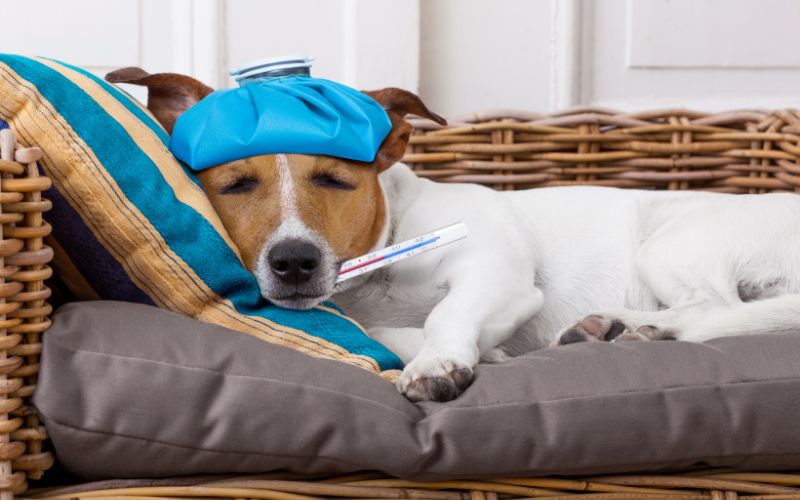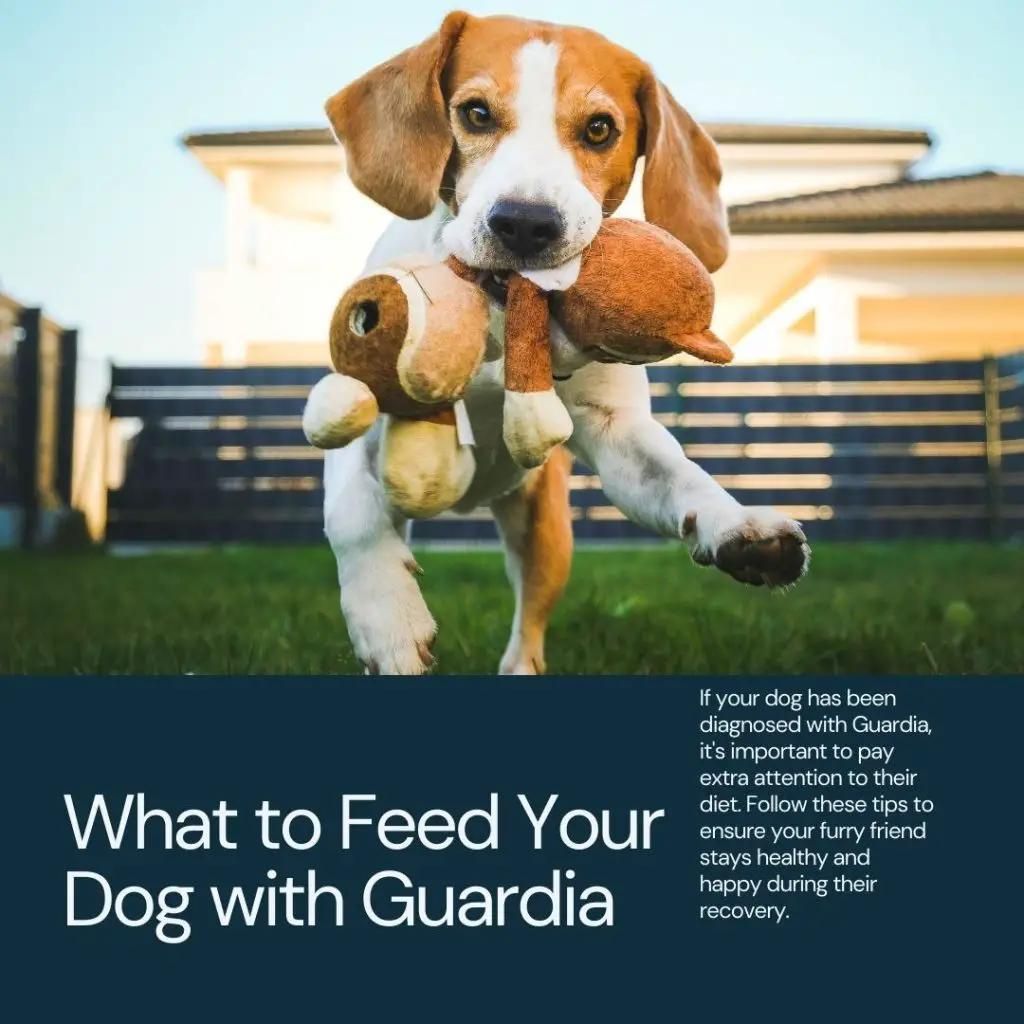Facing giardia in dogs requires prompt action and a special diet. Discover how a simple, vet-approved meal of mashed potato and canned tuna, combined with necessary medical treatment, can aid your dog’s recovery from this common intestinal parasite.
The best food to feed to a dog with giardia will be something that is easy to digest and is bland with no flavourings. Veterinarians often recommend a blend of mashed potato and canned tuna – a nutritious yet bland meal that appeals to dogs. Your dog also needs medicine from your vet to help him to recover.
Giardia is a nasty illness that one of my spaniels has experienced.
This horrible illness is caused by a parasite that attacks the intestines and causes smelly and watery, foul coloured diarrhoea and which makes your dog very unwell.
What is Giardia?
Giardia is a type of parasite that can infect both dogs and humans.
It is typically spread through contaminated food or water, and can cause gastrointestinal issues like diarrhea, vomiting, and weight loss.
My dog picked up Giardia from a trip to the beach.
If your dog has Giardia, it is important to get them treatment right away to help them feel better and avoid any further complications.
Without medical support from your vet, your dog will struggle to make a recovery and may become seriously unwell.
Key Takeaways:
- Giardia in dogs requires a bland, digestible diet for recovery.
- Mashed potato mixed with canned tuna is recommended by vets.
- Medical treatment is crucial alongside dietary changes.
- Boiled chicken and rice are also good dietary options.
- Hydration and avoiding dairy are key during recovery.
- Cleanliness and hygiene are vital to prevent giardia spread.
How does a dog get Giardia?
Giardia is a common intestinal parasite found worldwide, and dogs can become infected with it in several ways.
It’s worth noting that Giardia exists in an environment in two forms: trophozoites, which live in the intestines of infected animals, and cysts, which are shed in the faeces and can survive for several months in the environment under the right conditions.
HERE ARE THE PRIMARY REASONS THAT A DOG MAY CATCH GIARDIA:
CONTAMINATED WATER
Drinking contaminated water: Dogs can get Giardia by drinking water that has been contaminated with the faecal matter of infected animals.
This can include puddles, ponds, and streams, especially in areas where many animals are present.
CONTACT WITH INFECTED FAECES
Direct contact: Dogs may come into direct contact with infected faeces. This can happen during walks, at dog parks, or in any area where an infected animal has defecated.
GROOMING
Dogs that groom themselves or other animals may ingest Giardia cysts if they come into contact with contaminated fur or paws.
INGESTING CONTAMINATED OBJECTS
Eating or licking contaminated objects: Dogs can ingest Giardia cysts by licking or chewing objects that have come into contact with infected faeces, such as toys, grass, or other surfaces.
Eating contaminated food: Although less common, dogs can also get Giardia by eating food that has been contaminated with the parasite.
CONTACT WITH INFECTED ANIMALS
Socialising with infected dogs: Dogs socialising with others that are infected, especially in settings like kennels, shelters, or dog parks, may be exposed to the parasite through mutual grooming or playing.
ENVIRONMENT
Contaminated environments: Areas that are heavily populated with animals, such as kennels, shelters, or veterinary clinics, may have a higher risk of harbouring Giardia cysts.
How do I know if my dog has Giardia?
Identifying Giardia in dogs can sometimes be challenging because not all infected dogs will show clear signs of illness.
However, when symptoms do occur, they can be quite noticeable. Here are some signs that might indicate your pet has this illness:
- Diarrhoea
Consistency: Diarrhoea is often unusual in appearance, typically soft, pale, and sometimes frothy.
Smell: It may have a particularly foul smell.
Frequency: Affected dogs may defecate more frequently and may have accidents inside the house. - Weight Loss
Despite having a normal appetite, your pet might begin to lose weight. - Vomiting
Some dogs may vomit, although this is less common than diarrhoea. - Lethargy
Your dog may appear less energetic or enthusiastic than usual. - Poor Coat Condition
The coat may become dull and the skin may be in poor condition due to the inability to absorb vital nutrients.
What are the symptoms of Giardia in dogs?
The most common symptom of Giardia in dogs is diarrhea, which may be bloody or contain mucus.
Other symptoms can include vomiting, weight loss, appetite loss, lethargy, and fever.
If your pet is showing any of these symptoms, it’s important to take them to the vet for an evaluation.

How is Giardia diagnosed?
It can be tricky to diagnose because the symptoms can be caused by other conditions as well.
Your vet will likely start with a physical exam and a review of your dog’s medical history.
They may also recommend some diagnostic tests, like a stool sample, to look for the presence of the parasite.

Should I feed my dog if he has Giardia?
You should always get the professional advice of your vet if you have any concerns about treatment or the health of your pet, they will be able to offer qualified advice.
In the case of Giardia you should always get your dog to the vet as soon as possible.
He will need medicines to help him to defeat the illness and recover.
From my experience of dealing with this, it is better to feed your pet very small meals, several times a day, up to four times.
A bland diet is the best option – boiled chicken is an ideal choice mixed in with some plain, boiled white rice.
This will provide the nutrition that your pet needs to help him to recover but it is delivered in small quantities which minimise the level of disruption to an already poorly pooch.
See what to feed a dog with Giardia
Some general dietary recommendations that are often suggested for dogs with gastrointestinal upset include:
Boiled White Rice and Boiled Chicken: This is a bland diet that can be easy on a dog’s stomach. Ensure the chicken is skinless and boneless. The ratio is typically 2 parts rice to 1 part chicken.
Boiled White Fish: Like boiled chicken, boiled white fish can be easy for dogs to digest. Make sure there are no bones.
Pumpkin: Plain canned pumpkin (not pumpkin pie mix) can be beneficial for its fibre content, which can help firm up stools. It’s essential to introduce it slowly and in small amounts.
Probiotics: Some vets might recommend adding a canine-specific probiotic to your dog’s diet to help restore the balance of good bacteria in the intestines.
Easily Digestible Commercial Foods: There are commercial dog foods designed for gastrointestinal health. These can be beneficial for dogs with Giardia or other digestive issues.
Hydration: Giardia can cause diarrhoea, which can lead to dehydration. Ensure that fresh water is available at all times. If your dog is reluctant to drink, you might consider offering ice cubes or diluted chicken or vegetable broth (without onions or garlic).
Avoid Dairy: Most canines are lactose intolerant, and dairy can exacerbate diarrhoea.
Gradual Transition: If you’re changing your dog’s diet, do it gradually over several days. A sudden change can cause further gastrointestinal upset.
What should I do if my dog has Giardia?
You should take him to the vet’s who can prescribe him with medicines that can help to alleviate the symptoms and the discomfort of diarrhea and which will, at the same time, deal with the nasty parasite that causes the illness.
You should also make sure that your dog has access to his own supply of clean water, which you should replace regularly.
It is important that you keep his dishes away from other pets to prevent the risk of infection passing to them.
Keep your dog quiet, take him out frequently, on his own, as he will need to use the toilet, and make sure that you clean up any stools or diarrhea to prevent other dogs from potentially catching the illness.
Other food options for dogs with Giardia
Many people have used a variety of foods to deal with giardia in their dogs, however, I have not used any of these, preferring to take the professional vet advice for my dogs.
This is not to say that these remedies and foods have worked for people, but I’m not making any recommendations, this is for information only.
Probiotics – the positive effects of probiotics for improving gut health is widely known and many dog owners have used these when feeding.
High fibre food – such as carrots,, swedes and others – cooked to make them easier to eat and digest
Seeds – pumpkin seeds added to bland and softer meals
Cloves – a US study found that the oil in cloves can assist with treatment
Garlic – although not normally suited to dogs, small quantities of garlic can help to deal with parasites
[amazon box=”B01N43QQ10″ template=”horizontal” title=”Probiotics for dogs” description=” “]
How is Giardia treated?
If your dog is diagnosed, there are several treatment options available.
The most common approach is to give your dog medication that will kill the parasites, such as metronidazole or fenbendazole.
Your vet may also recommend some supportive care, like IV fluids, to aid recovery from the infection.
In addition, the vet will most likely prescribe medication(s) to treat any diarrhea or stomach issues.
Once your dog finishes treatment, the vet will probably retest them to make sure that the parasite is gone.
If not, they may suggest treating all pets in your house so that none can give Giardia back to your dog.
Once your dog has been diagnosed, a bland diet is essential for their treatment.
This kind of food is easy to digest and promotes healing in the gastrointestinal tract.
Vets typically recommend feeding your pet this way until their stool returns to its normal consistency; which takes anywhere from three to 10 days.
If your dog has Giardia, they may also have an imbalance in the good bacteria in their gut, which is called the microbiome.
If this is suspected, your vet may recommend a therapeutic food that will help improve the balance of microbes in their gut.
Always follow the vet’s instructions carefully, make sure your pet takes all medications as prescribed, and call the vet if you don’t see any improvement after treatment has begun.
Humans can also get Giardiasis.
If your dog has been diagnosed with or suspected to have the condition, you should use gloves when handling their faeces (always a good idea) and wash your hands thoroughly afterward.
Giardia infection in canines is usually unpleasant, but, with treatment from your vet, your pet should make a recovery.
How can I prevent Giardia?
The best way to prevent it is to practice good hygiene and keep your dog’s environment clean.
This means regularly cleaning their food and water bowls, and being careful about where they eat and drink.
If you suspect that your dog has been exposed to contaminated food or water, it’s important to take them to the vet right away for an evaluation.
PREVENTATIVE MEASURES
Clean water: Always provide clean, fresh water for your dog and try to prevent them from drinking from standing water outdoors.
Hygiene: Regularly clean and disinfect your dog’s living area, bedding, and toys.
Poo patrol: Promptly remove and dispose of your dog’s faeces and avoid areas where faecal matter is present.
Veterinary care: Regular vet check-ups and following a deworming schedule can help in preventing and early detection of illnesses and other parasites.
It’s essential to be aware of the symptoms of this horrible illness, which can include diarrhoea, vomiting, weight loss, and a generally poor condition, to seek veterinary care promptly if you suspect an infection.
Remember that Giardia can also infect humans, so always ensure to wash your hands thoroughly after handling animals or cleaning up after them.
FAQs
What to feed a dog with Giardia to help manage the condition?
When dealing with Giardia in dogs, it’s important to provide a balanced and easily digestible diet.
Opt for high-quality commercial food that is specifically formulated for sensitive stomachs or gastrointestinal health.
Look for easily digestible protein sources such as chicken or turkey, and avoid ingredients like grains or fillers that may further irritate the digestive system.
Can I give my dog any special supplements or probiotics to help?
While it’s always best to consult with your veterinarian before introducing any supplements or probiotics, some options may be beneficial.
Probiotics containing beneficial bacteria strains like Lactobacillus acidophilus or Bifidobacterium can help support a healthy gut flora.
Additionally, certain supplements like slippery elm bark or marshmallow root may have soothing properties for the gastrointestinal tract, but their usage should be discussed with a vet.
Are there any specific foods I should avoid feeding my dog with Giardia?
It’s important to avoid feeding your dog any foods that could exacerbate their gastrointestinal issues.
Foods high in fat, spices, or artificial additives can be hard to digest and may worsen symptoms.
Additionally, it’s generally recommended to avoid feeding raw or undercooked meats during this time, as they may contain bacteria or parasites that could further compromise your dog’s health. Always consult with your vet to determine the best diet plan for your dog’s specific needs.
What to feed a dog with Giardia if they are picky eaters?
For picky eaters, it’s important to find bland, digestible foods that they will eat. Boiled chicken, turkey, or lean ground meat can be good options. Mixing these proteins with plain, boiled rice or white potato can make the meal more appealing. Always ensure the food is cool and bland to avoid further gastrointestinal upset.
My vet told me to use a bland food made from mashed potato and tinned tuna fish and I took his advice.
You should always base your decisions on professional advice from your veterinary surgeon.
Many people report that probiotics, high fibre foods and others have supported their dog’s recovery and these may be options that your vet could recommend.
Remember:
Always consult with your vet before making any significant changes to your dog’s diet, especially when dealing with a medical condition.
Giardia is contagious, and it can spread across species, including humans, so it’s essential to maintain good hygiene, clean up after your dog promptly, and prevent them from drinking from stagnant water sources.
Regularly disinfect areas where your dog spends time, and wash your hands thoroughly after handling your dog or cleaning up after them.
Ensure your dog completes any prescribed medication, even if symptoms improve.
Lastly, always monitor your pet’s condition closely. If symptoms worsen or if new symptoms appear, contact your vet immediately.




